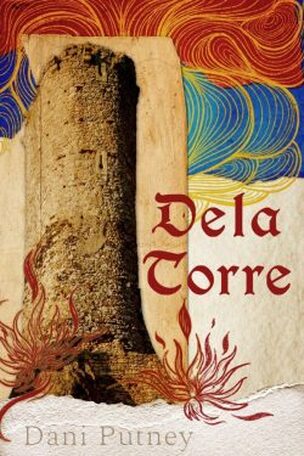“For all the mutts.” Dela Torre, the most recent chapbook from poet and essayist Dani Putney, opens with this dedication. Simple and effective, they give no other preface before diving into 20-some pages of raw, emotional poetry where they break down their own mixed-race heritage, the history of their parents, and tear into colonialism with sharpened teeth. While Dela Torre runs rife with various themes about identity and family, there is one through-line that can be felt in each and every one of these poems— anger. As you learn very quickly in Dela Torre, Putney identifies as mixed-race Filipinx. Not only this, they are also a queer and neurodivergent writer. While this is not addressed directly in the chapbook, the feeling of layered displacement comes through clearly in each poem. Coming from a background that is, in many ways, similar to Putney’s own, this was a breath of fresh air to me as a reader. Too often are we asked to be placated by the bare minimum of representation, by DEI offices, by scholarships for marginalized people. Putney attacks these ideals at their base, and begs the question…why? Why should we be satisfied with platitudes when our families have spilled blood for the so-called “American Dream”? “I see myself in the cup’s crushed / ice, scattered like the islands / throughout an archipelago, / the shards of my DNA floating / in evaporated milk” (lines 13-17) Putney expresses this anger, when not outright, through perhaps the only universal language: food. Eating is a constant image throughout Dela Torre—how can it not be? Eating is something that is so integral to human life, not only for survival, but for community. In “Halo-Halo,” Putney describes the feeling of being like this heterogenous dessert: “I see myself in the cup’s crushed / ice, scattered like the islands / throughout an archipelago, / the shards of my DNA floating / in evaporated milk” (lines 13-17). In “Kimchi”, they address the fact that Americans have dictated Asian culture, writing, “[but] my picture of Asia / was painted in America— / as an American, I can choose / from curated Eastern symbols” (lines 8-11). Kimchi is not a Filipino food, and yet, Putney feels it links them to their culture because it has been dictated to them that it should. At this point in the chapbook, this is still pretty consistent with the traditional image of food as representative of culture and family, but it soon evolves into something more. Putney expresses the desire to consume as a vengeful act, referencing outright cannibalism in some pieces and a more metaphorical eating in others. To devour and to be devoured—is that not what we feel as cultural “others”? American culture has devoured what we have of identity, of heritage, has chosen which parts they want and spat us back out. To turn our teeth on colonialism, to devour that which has devoured, is the ultimate act of revenge. The problem here is not so much that Putney wants to eat colonialism, but that to do so, even figuratively, is a reclamation of the culture that was stolen from us. Communion, in a sense, which brings us closer to who we are. To turn our teeth on colonialism, to devour that which has devoured, is the ultimate act of revenge. Putney is expressing their rage, their bereavement, and through doing such, is encouraging the reader to do the same. So often, narratives of heritage take the tone of celebration or of sorrow. We are told to be grateful for the life our ancestors gave us, but as Putney writes, “Luck is not being born at all” ("Heritage," line 36). We are forced to hide our anger, but Putney needs no permission to share it. Their frustration is loud and clear, and it is what makes the poems in this chapbook feel so raw. Dela Torre is a book written “for all the mutts.” For everyone told that they exemplify the American dream, even when they wish they could be anywhere, anything but. It is a book that gives us permission to be wildly, unapologetically angry, to bite the hand that bit at us. Dela Torre is a collection that says what us self-proclaimed “mutts” have been holding back for much of our lives. “This work of art is / an indictment. Your white- / flight prayers book- / ended with exclamation marks & empty anecdotes / won’t reach me” (lines 1-5) Putney says it best: “This work of art is / an indictment. Your white- / flight prayers book- / ended with exclamation marks & empty anecdotes / won’t reach me" ("This work of art is," lines 1-5). They are bitter, they are honest, and they are unapologetic. In doing so, they give us the permission to be the same.
0 Comments
Leave a Reply. |
Archives
July 2024
Categories
All
|
|
Glassworks is a publication of Rowan University's Master of Arts in Writing 260 Victoria Street • Glassboro, New Jersey 08028 [email protected] |
All Content on this Site (c) 2024 Glassworks
|


 RSS Feed
RSS Feed
